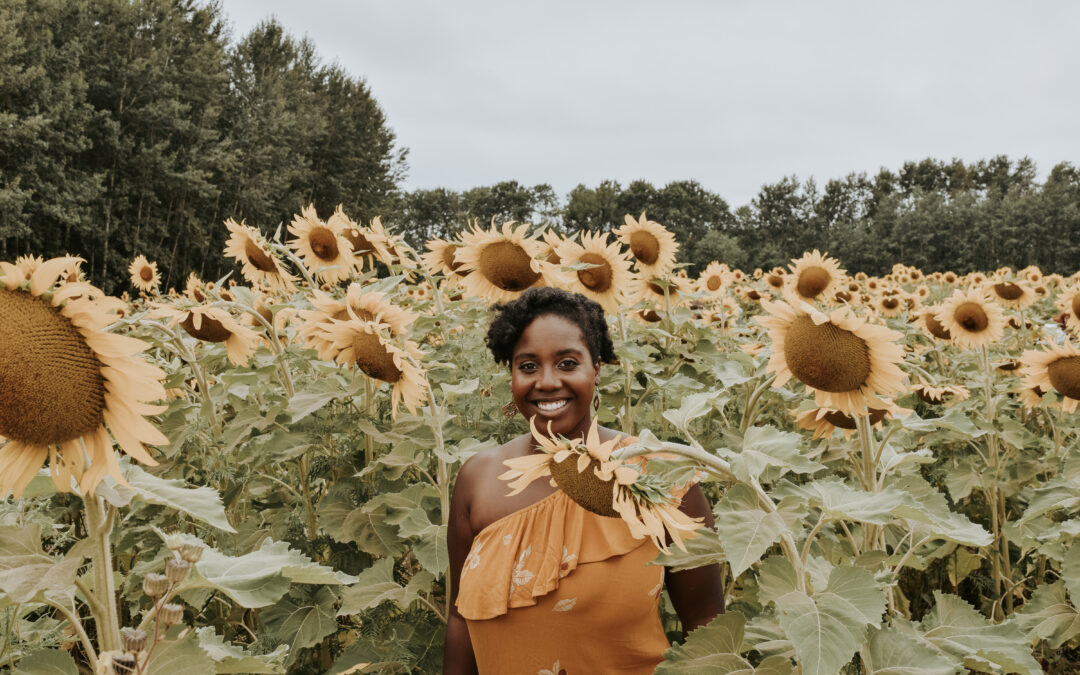Curious to understand the intersections that lie within the collegiate recovery field we spoke to four moms who are collegiate recovery staff: Dr. Kristine De Jesus, Kristina Canfield, Amy Boyd Austin, and Thenedra Roots. They shared their insight into the challenges they face and how they handle them, and offer advice and resources to help other moms navigating collegiate recovery and motherhood.
Kristina: It often feels like I can never “turn off.” I am either assisting students with their needs, advocating for my CRC, or being mom/teacher/playmate for my daughter. I have described this as feeling like I have to wear all of my hats simultaneously. There is no real divide between “work time” and “mom time.” I even miss the pause of sitting in rush hour traffic at 5pm.
Kristine: Working in collegiate recovery and being a mom feels like I have to be always “on” all the time. It has been even harder since the start of the pandemic, when the distress is at an all time high, and everyone’s normal coping mechanisms are largely not available in the same way.
Thenedra: The biggest challenge has been trying to keep structure in my day, given I’m working from home and trying to parent. I didn’t realize how much my entire family thrives off of structure and it’s nearly impossible to have that now because I do not leave the house. I also feel like everyone is in very high need right now. My own children and the students I serve. Everything is more intense because we all are living in our first pandemic.
Amy: Wow, my reaction to the ask of submitting to this blog is both gratitude for the opportunity to bring this challenge to the forefront – and exhaustion/exasperation that it feels like more work/responsibility to educate on the overwhelming responsibilities of working mothers.
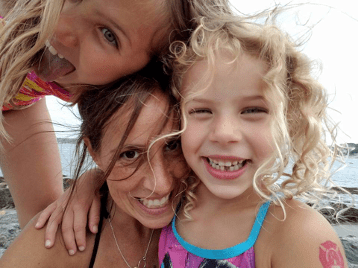
The truth is, I’m overwhelmed with the prospect of responding to this question. Most of us in this dual role just plain don’t have the time to do it justice; and I would not want to sell any of my sister working mother’s short by not fully capturing the experience. I am also just one person, with one experience. There are aspects which are shared by other working mothers, but there are many other layers based on other social identities (race, class, education, sexual orientation) which impact the working mom experience that I’m not able to represent.
I’ve recently dipped my toe in the genius of Audre Lorde. One thing I’ve been incredibly grateful for is her work in giving voice to experiences in the world that words don’t yet exist for. I am forever wanting and needing people to understand the vastness of the role of motherhood, but without time, patience, or words to express it. The level of gratitude I experience when I’m in the presence of a sister working mom – someone who understands what I’m feeling/going through without saying a word is immense. Several years ago I came across a comic in the Guardian that gave words to what I experience as a mom in a heterosexual partnership. It described a “mental load” and women’s roles as “managers” in the household. Before reading further, I suggest checking it out. And while its frame feels like early mom/parenthood, trust that the mental load and managerial responsibilities increase exponentially as you have school age children and beyond. https://www.theguardian.com/world/2017/may/26/gender-wars-household-chores-comic
Now, add in that COVID experience and the mental load as well as physical work expands – now we’re working from home, distance learning our children, reading the multitudes of emails from our kids’ schools, learning Google Classroom, video conferencing with teachers, trying to troubleshoot glitchy Chromebooks and overwhelmed WiFi, communicating with daycares, after school activities, camps, etc. We’re ordering masks, disinfectant and hand sanitizer, we’re scouring (no pun intended) the aisles of grocery stores and markets (going the correct direction of course) for alternative meals when all the family favorites are wiped out. We’re planning creative ways to honor our kids’ birthdays with drive-bys, signage, celebrations, and social media posts; and we’re coming up with ways for our kids to have a sense of connection and friendship, creativity and safety; we’re worrying about early signs of depression and anxiety in our kids and exploring avenues to validate and support; we’re trying to keep our families active, healthy, connected and uplifted; all while holed up in our respective homes.
And all that’s without actually going to work or getting paid. Work feels similar except that there is a paycheck at the end of the two-week rainbow. Many of us who run CRPs are doing so solely. Which means we play a lot of roles, think admissions, recruitment, retention, academic support, health and wellness, program planner, research and assessment, statistician, budget manager and finance guru, marketing and social media, institutional resource expert, and community builder. Wearing all these hats for me translates similarly to the comic – but it’s within the work context, and sometimes all while I’m sitting at my computer. Developing a social media post to highlight upcoming events, I remember that some of my students are taking a break from social media, so I need to develop it as an email too. In creating that communication I see that I have an email from the Disbursement Center telling me when I can pick up the Costco card to do our monthly trip to replenish our CRP Lounge supplies. This reminds me that I need to do inventory. Which reminds me that I need to check on the cleaning supplies that I need to get through the University. All of which I have to get approved because there’s a budget freeze due to COVID . . . but still need to keep students engaged and involved. And now I remember that it’s time to submit my purchase card to reconcile any purchases from last month’s programming. So, I’m back to the social media post and the email and looking through institution-based activities, as well as local activities and figuring out which day on my weekend has fewer kid activities to schedule around and then I’m bringing my kids to the event because I don’t have alternative care, and splitting my attention between the CRP Community and my kids – neither getting their fair share. So, in terms of the comic, I’ve spent two hours “clearing the table,” only to then give up a weekend day/time with my family/time for self/time for home responsibilities.
This is how it feels all the time. COVID adds another layer – but this is how it is all the time.
ARHE: How have you navigated those challenges?
Thenedra: I’ve had some days that I’ve done better than others. One way is to be intentional about time alone to recharge my own batteries. I’ve also gotten creative with my daily routine with my children. We’ve done a lot of art and I’ve accepted that my house will forever be messy and that’s okay. Because we live in Minnesota, our winters are cold, dark and long so I’ve also been utilizing my therapy light as well as suggesting my students use it as well.
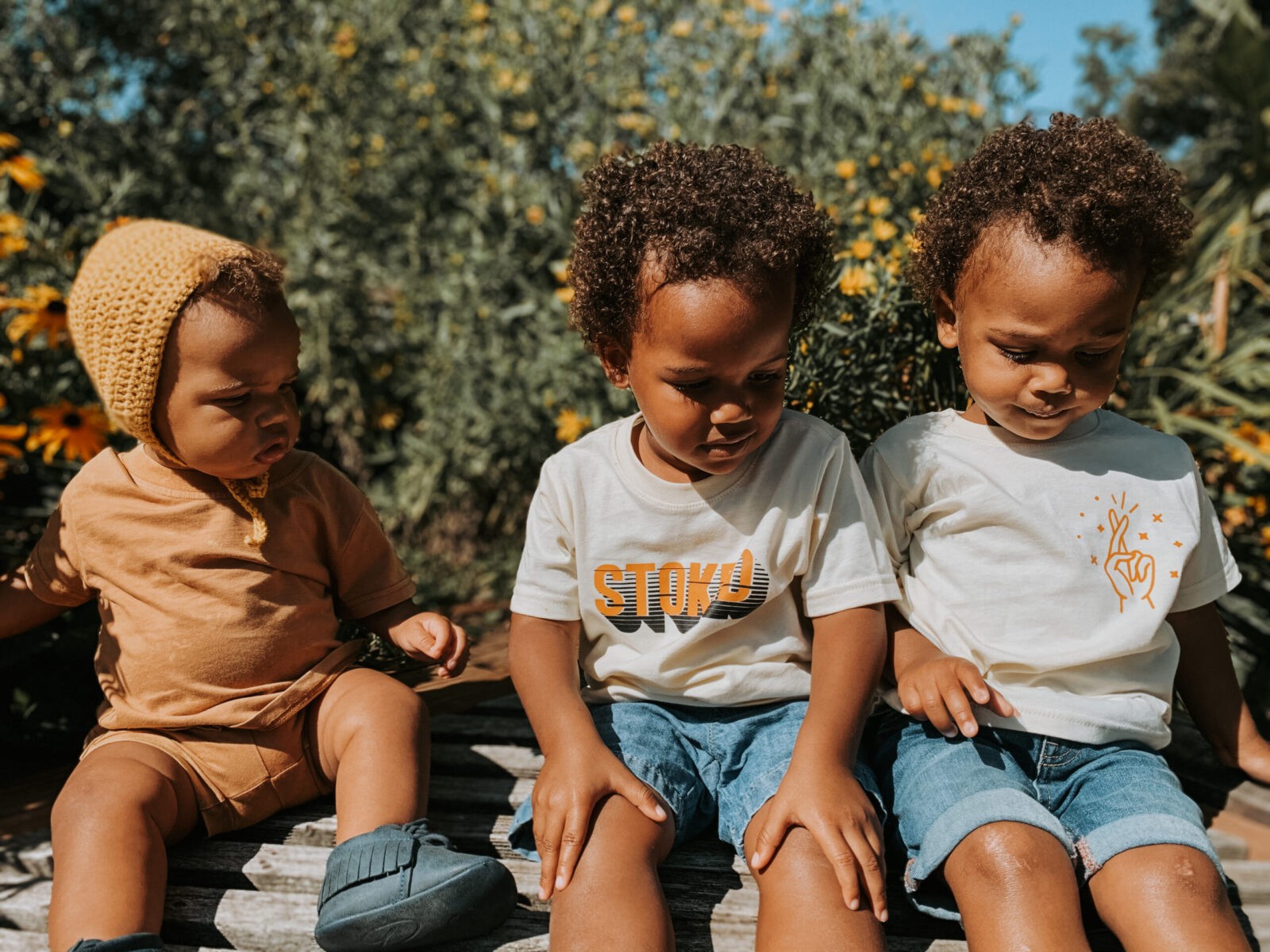
Thenedra’s children
Kristine: I have found that connecting with other BIPOC folx has been incredibly helpful in that there is a shared experience of navigating systems of oppression. I find myself meditating multiple times a day since the pandemic as it feels critical for self-preservation.
Amy: The white supremacy system tells me I should feel pride in keeping it all together; being productive; and feel a sense of accomplishment. In reality, I navigate these challenges one day at a time – sometimes I do well, some days feel like absolute garbage and I feel like I’m failing everyone and everything. My support comes from being in community with other working mom’s and being vulnerable about my struggles.
Kristina: I don’t know that I have always done this well. At one point in June, I was forced to make my own mental health the priority and checked myself into our local psychiatric hospital. Though, I felt a lot of shame and embarrassment about this at first, I know now that I desperately needed that pause, that reset. I cannot fulfill any of my roles if I am not taking care of myself and that is nothing to be ashamed of. There was a lot of freedom in asking for help.
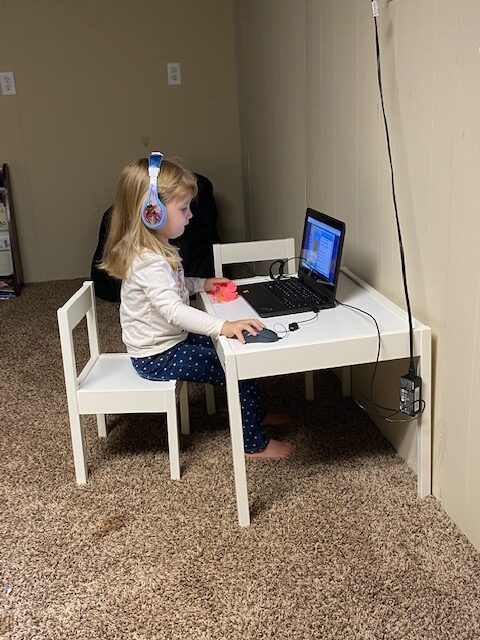
Kristina’s daughter, Scarlett
ARHE: What advice would you offer to other working moms who may be feeling overwhelmed?
Kristine: Connecting with other mom’s with similar lived experiences has been a lifeline. The reminder that we are all living through collective trauma and doing our best to survive helps me to remember that it is okay to struggle.
Kristina: Know that you are not alone and that we are all doing the best we can, and that looks different from everyone. I felt like a “bad mom” for wanting a break, for needing a break, but we are not “bad moms.” We are humans forced into an impossible situation. My therapist said to me recently, “I don’t know of one person who sat down and thought to themselves, ‘Hmmmm, what will parenting be like in a pandemic?’ before they had kids. That made me chuckle and feel a lot better in the moment.
Thenedra: You are not alone and it’s okay if more screen time is happening right now. I didn’t realize how much we relied on children’s museums, the mall, randomly walking in stores and the zoo for keeping our kids busy. That’s not an option, so give yourself some grace and know that you’re a great mom, even on your hardest days.
Amy: I think I’d probably skip the advice giving and start with validating her experience. What she’s feeling is a legitimate response to unrealistic expectations laid upon her. I would share some of my own experiences and that one thing that’s been helpful to me is having a working mom’s group; a place where I can be real and talk about these challenges with people who know, understand, and are willing to be equally vulnerable (i.e. not put on the ‘I got this’ persona society rewards). The only advice I would offer is what I share with anyone about to become a parent. Trust yourself. Trust your instincts.
ARHE: Are there any specific resources that you have found helpful?
Thenedra: Not Safe for Moms Group is an awesome resource that connects you with a community of moms who need space to talk about the hard stuff. They have a website and an Instagram account.
Amy: My working Mom’s group. My white affinity groups. My book club.
Kristine: The app Insight Timer has been such a great resource, for myself, friends, and students. I am so grateful to be able to have this tool to help with self-regulation.
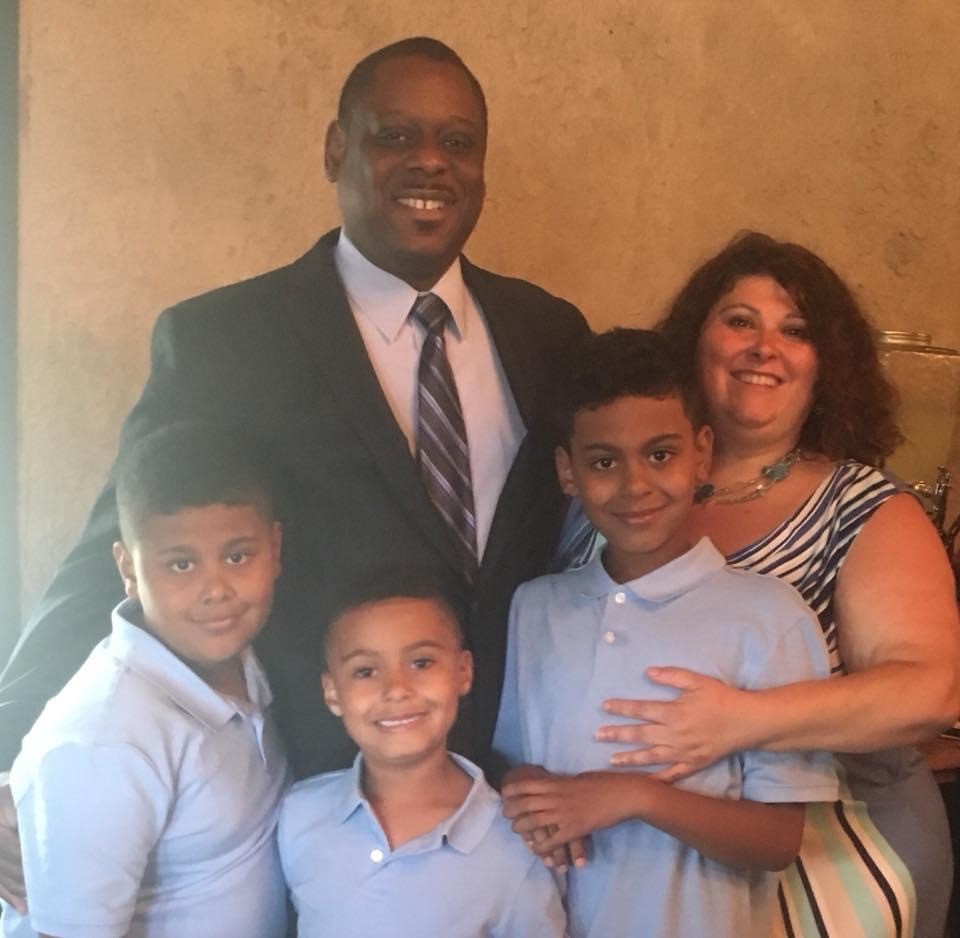
Kristine and her family
Kristina: Therapy. Therapy. Therapy. Talking with other people in the same situation. Carving out time for me, even if it is at midnight. I need to reset. I need to pause. That is what I learned about myself over the summer.
ARHE: Is there anything in particular you wish you knew back in March that may have helped?
Amy: While COVID adds an additional layer, it would be disrespectful to the amount of work women put into parenting, house-holding, working, spousing, financing, etc. to make special references to the past eight months.
Thenedra: Honestly, I think if I would have known what I know now, it would have caused more anxiety. You really can’t compare anyone for this, so I’m just grateful that my family had only suffered from cabin fever and not COVID.
Kristina: To put my mental health first. I don’t know if there is really anything that could have prepared me for any of this, though. We are doing the best we can each day, and I often have to remind myself of that very thing, “we are doing the best we can.” My daughter is happy and healthy and oh so resilient. I am healthy and happier. That’s what really matters.
Kristine: I wish we had thought to use more technology to support our students in recovery and how online groups would be helpful as recovery supports.

